#Lord Mayor of Cork
Text
#OTD in Irish History | 17 April:
In the Liturgical calendar, today is the Feast Day of Saint Donnán of Eigg, a Gaelic priest, likely from Ireland, who died on this date in 617. He attempted to introduce Christianity to the Picts of northwestern Scotland during the Early Middle Ages. Donnán is the patron saint of Eigg, an island in the Inner Hebrides where he was martyred. The Martyrology of Donegal, compiled by Michael O’Clery…

View On WordPress
#irelandinspires#irishhistory#OTD#17 April#Bernadette Devlin#Charles Stewart Parnell#Co. Wicklow#Fiachra Mangan Photography#Glenmalure#History#History of Ireland#Ireland#Irish History#Lord Mayor of Cork#Paul McGrath#The Black Pearl#Today in Irish History#Tomás MacCurtain
9 notes
·
View notes
Text




Cork Pride & patchouli ft. The Lord Mayor
12 notes
·
View notes
Text
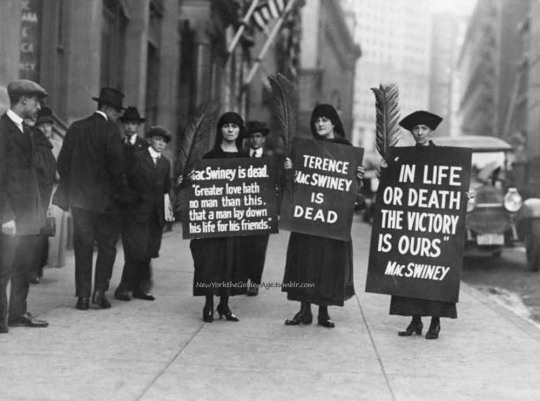
Three Irishwomen, dressed in black, carry palms of victory and placards that read, "Terence MacSwiney is dead—greater love hath no man than this, that a man lay down his life for his friends," "Terence MacSwiney is dead," and "In life or death the victory is ours—MacSwiney" during a parade downtown, ca. 1920. MacSwiney was an Irish playwright, author, and Sinn Fein Lord Mayor of Cork who died in October 1920 after 74 days on hunger strike, having been imprisoned at Brixton Prison by the British Government on charges of sedition.
Photo: Keystone View Company/Keystone/Hulton Archive/Getty Images
#New York#NYC#vintage New York#1920s#Sinn Fein#Terence MacSwiney#Irish republicanism#Irish republic#demonstration#parade#political causes#placards
42 notes
·
View notes
Text

"It is not those that inflict the most, but those that endure the most, that shall win."
— Terence MacSwiney,
Irish playwright, author, and politician, who assumed office as Lord Mayor of Cork during the Irish War of Independence in 1920, and was arrested by British forces on charges of sedition, then incarcerated in Brixton Prison, where he died after 74 days on hunger strike, bringing the Irish cause to the attention of the world.
2 notes
·
View notes
Text
Queen's practice
Dearest creature in creation,
Studying English pronunciation.
I will teach you in my verse
Sounds like corpse, corps, horse, and worse.
I will keep you, Suzy, busy,
Make your head with heat grow dizzy.
Tear in eye, your dress will tear.
So shall I! Oh hear my prayer.
Just compare heart, beard, and heard,
Dies and diet, lord and word,
Sword and sward, retain and Britain.
(Mind the latter, how it's written.)
Now I surely will not plague you
With such words as plaque and ague.
But be careful how you speak:
Say break and steak, but bleak and streak;
Cloven, oven, how and low,
Script, receipt, show, poem, and toe.
Hear me say, devoid of trickery,
Daughter, laughter, and Terpsichore,
Typhoid, measles, topsails, aisles,
Exiles, similes, and reviles;
Scholar, vicar, and cigar,
Solar, mica, war and far;
One, anemone, Balmoral,
Kitchen, lichen, laundry, laurel;
Gertrude, German, wind and mind,
Scene, Melpomene, mankind.
Billet does not rhyme with ballet,
Bouquet, wallet, mallet, chalet.
Blood and flood are not like food,
Nor is mould like should and would.
Viscous, viscount, load and broad,
Toward, to forward, to reward.
And your pronunciation's OK
When you correctly say croquet,
Rounded, wounded, grieve and sieve,
Friend and fiend, alive and live.
Ivy, privy, famous; clamour
And enamour rhymes with hammer.
River, rival, tomb, bomb, comb,
Doll and roll and some and home.
Stranger does not rhyme with anger,
Neither does devour with clangour.
Souls but foul, haunt but aunt,
Font, front, wont, want, grand, and grant,
Shoes, goes, does. Now first say finger,
And then singer, ginger, linger,
Real, zeal, mauve, gauze, gouge and gauge,
Marriage, foliage, mirage, and age.
Query does not rhyme with very,
Nor does fury sound like bury.
Dost, lost, post and doth, cloth, loth.
Job, nob, bosom, transom, oath.
Though the differences seem little,
We say actual but victual.
Refer does not rhyme with deafer.
Foeffer does, and zephyr, heifer.
Mint, pint, senate and sedate;
Dull, bull, and George ate late.
Scenic, Arabic, Pacific,
Science, conscience, scientific.
Liberty, library, heave and heaven,
Rachel, ache, moustache, eleven.
We say hallowed, but allowed,
People, leopard, towed, but vowed.
Mark the differences, moreover,
Between mover, cover, clover;
Leeches, breeches, wise, precise,
Chalice, but police and lice;
Camel, constable, unstable,
Principle, disciple, label.
Petal, panel, and canal,
Wait, surprise, plait, promise, pal.
Worm and storm, chaise, chaos, chair,
Senator, spectator, mayor.
Tour, but our and succour, four.
Gas, alas, and Arkansas.
Sea, idea, Korea, area,
Psalm, Maria, but malaria.
Youth, south, southern, cleanse and clean.
Doctrine, turpentine, marine.
Compare alien with Italian,
Dandelion with battalion.
Sally with ally, yea, ye,
Eye, I, ay, aye, whey, and key.
Say aver, but ever, fever,
Neither, leisure, skein, deceiver.
Heron, granary, canary.
Crevice and device and aerie.
Face, but preface, not efface.
Phlegm, phlegmatic, ass, glass, bass.
Large, but target, gin, give, verging,
Ought, out, joust and scour, scourging.
Ear, but earn and wear and tear
Do not rhyme with here but ere.
Seven is right, but so is even,
Hyphen, roughen, nephew Stephen,
Monkey, donkey, Turk and jerk,
Ask, grasp, wasp, and cork and work.
Pronunciation -- think of Psyche!
Is a paling stout and spikey?
Won't it make you lose your wits,
Writing groats and saying grits?
It's a dark abyss or tunnel:
Strewn with stones, stowed, solace, gunwale,
Islington and Isle of Wight,
Housewife, verdict and indict.
Finally, which rhymes with enough?
Though, through, plough, or dough, or cough?
Hiccough has the sound of cup.
My advice is give it up!
2 notes
·
View notes
Text
Events 10.25 (after 1920)
1920 – After 74 days on hunger strike in Brixton Prison, England, the Sinn Féin Lord Mayor of Cork, Terence MacSwiney dies.
1924 – The Zinoviev letter, which Zinoviev himself denied writing, is published in the Daily Mail; the Labour party would later blame this letter for the Conservatives' landslide election win four days later.
1927 – The Italian luxury liner SS Principessa Mafalda sinks off the coast of Brazil, killing 314.
1932 – George Lansbury became the leader of the opposition British Labour Party.
1940 – Benjamin O. Davis Sr. is named the first African American general in the United States Army.
1944 – World War II: Heinrich Himmler orders a crackdown on the Edelweiss Pirates, a loosely organized youth culture in Nazi Germany that had assisted army deserters and others to hide from the Third Reich.
1944 – World War II: The USS Tang under Richard O'Kane (the top American submarine ace of the war) is sunk by the ship's own malfunctioning torpedo.
1944 – World War II: The final attempt of the Imperial Japanese Navy to win the war climaxes at the Battle of Leyte Gulf.
1945 – Fifty years of Japanese administration of Taiwan formally ends when the Republic of China assumes control.
1949 – The Battle of Guningtou in the Taiwan Strait begins.
1962 – Cuban Missile Crisis: Adlai Stevenson shows the United Nations Security Council reconnaissance photographs of Soviet ballistic missiles in Cuba.
1968 – A Fairchild F-27 crashes into Moose Mountain while on approach to Lebanon Municipal Airport in Lebanon, New Hampshire, killing 32 people.
1971 – The People's Republic of China replaces the Republic of China at the United Nations.
1973 – Egypt and Israel accept United Nations Security Council Resolution 339.
1980 – Proceedings on the Hague Convention on the Civil Aspects of International Child Abduction conclude.
1983 – The United States and its Caribbean allies invade Grenada, six days after Prime Minister Maurice Bishop and several of his supporters are executed in a coup d'état.
1990 – The Kazakh Soviet Socialist Republic declares its sovereignty from the Soviet Union.
1995 – A commuter train slams into a school bus in Fox River Grove, Illinois, killing seven students.
1997 – After a civil war, Denis Sassou Nguesso proclaims himself President of the Republic of the Congo.
1999 – A Learjet 35 crashes in Mina near Aberdeen, South Dakota, killing all six people on board, including PGA golfer Payne Stewart and golf course designer Bruce Borland.
2001 – Microsoft releases Windows XP, which becomes one of Microsoft's most successful operating systems.
2009 – The October 2009 Baghdad bombings kill 155 and wound at least 721.
2010 – Mount Merapi in Indonesia begins a month-long series of violent eruptions that kill 353 people and cause the evacuation of another 350,000 people.
2010 – A magnitude 7.8 earthquake strikes off Indonesia's Mentawai Islands, triggering a tsunami that kills at least 400 people.
0 notes
Text
When JFK came to Cork | 28 June 1963
by Mary Horgan
This summer marks the 60th anniversary of the visit of President John Fitzgerald Kennedy, 35th President of the United States of America, to Cork. As part of his historic four-day trip to Ireland, five months before his assassination in Dallas on 22nd November 1963, he visited Wexford, Dublin, Galway, Limerick and Cork. JFK’s eight great grandparents had emigrated to America during the 19th century. Welcoming him back to the homeland of his ancestors was for so many, like welcoming one of their own home again.
Interestingly, a visit to Cork was not originally on the agenda, but anticipation rose two weeks before the president’s arrival in the country, when the Evening Echo reported that ‘Mr. Kennedy himself had asked specifically that Cork be included as part of his Irish itinerary’ as some of his ancestors had hailed from the county.

Evening Echo, 14 June 1963
But also, Cork people don’t like to be excluded and can be very persuasive; remember, how in 2011, Cork made certain that Queen Elizabeth II would not leave Ireland without visiting the city. At a meeting of Cork Corporation on 26 May 1963, it was agreed that the Freedom of Cork should be offered to President Kennedy. On 11 June, he was formally nominated and elected a freeman of the city of Cork, with the actual conferring to take place during his visit on 28 June 1963. This was the second time that a U.S. president became a Freeman of Cork; the first being, Woodrow Wilson, in 1919. As the day of the visit drew closer, the public learnt more about the planned itinerary through the local press. On 21 June, Lord Mayor Seán Casey, T.D. issued an appeal to employers to allow their staff time off work to welcome the U.S. President and requested that businesses and houses along the route of the motorcade would decorate their premises for the occasion. Sixty telephone lines and specialized wired photograph facilities for members of the world’s press were installed in the City Hall and 900 gardaí were allocated to be on duty during the Cork visit.
On the morning of Friday 28 June 1963, five helicopters left Dublin carrying JFK and entourage. Shortly after 10a.m. the sound of helicopters could be heard above the streets of Cork. Ten minutes later, the President landed safely on the square in Collins Barracks, on the north side of the city. The official welcoming party included Lord Mayor Seán Casey, Jack Lynch, T.D. who was Minister for Industry and Commerce at the time and Walter McEvilly, the City Manager. The combined pipe bands of the 4th and 12th Infantry Battalions played ‘The Boys from Wexford’ and ‘Kelly the Boy from Killane’.

President Kennedy inspects a Guard of Honour as he departs Collins Barracks
(Courtesy of Irish Examiner Archives)
The Presidential motorcade consisted of fourteen vehicles, including three buses for members of the world’s press and a Secret Service car – not a common site on the streets of Cork. An estimated 100,000 people, some carrying American flags, lined the streets, as the motorcade made its way down Summerhill, along MacCurtain Street, over Patrick’s Bridge, then along Patrick Street, Grand Parade, South Mall and over Brian Boru Bridge to the City Hall.

(The Irish Times, 29 June 1963)
The bells of Shandon rang out across the city, and it seemed that at almost every corner, musicians felt compelled to show their joy at the visit by taking up their instruments. The Irish Times reported that: ‘Rose petals, confetti streamers and ticker tape were strewn along President Kennedy’s path as almost 100,000 Leesiders roared a Céad Míle Fáilte, again and again’. Businesses had followed the Lord Mayor’s request to close and erected signs such as: ‘Closed, gone to meet President Kennedy’. In their excitement, sometimes the crowds surged forward, eager to shake JFK’s hand, make eye contact, clap him on the back, thank him for coming, while concerned Secret Service men looked on. But he was in no danger in this place, and he must have felt that because sometimes he even leaned forward from the car and brushed hands against the outspread fingers of people nearest the motorcade.

President Kennedy’s motorcade nears the top of Patrick Street
(JFK Library)
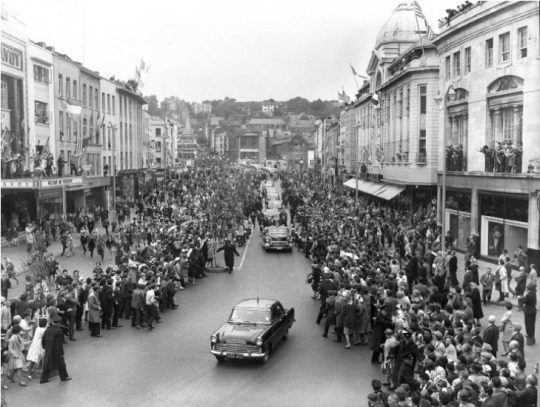
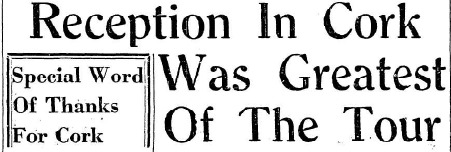
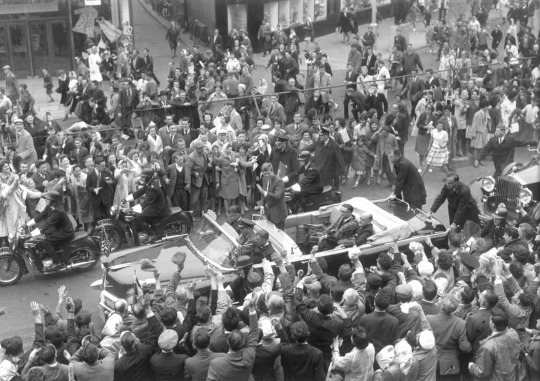
President Kennedy accompanied by Lord Mayor Seán Casey waves to cheering crowds as the motorcade makes its way along Patrick Street
(Courtesy of Irish Examiner Archives)

Evening Echo, 28 June 1963
When the motorcade finally arrived at the City Hall, 2,000 invited guests awaited the president inside the Concert Hall, where his entrance was greeted by a fanfare of trumpets from the Southern Command Band.
On behalf of the city, the Lord Mayor welcomed him with the following words:
‘Throughout its long history, Cork has received many famous visitors from many parts of the world but I can confidently say that no man has ever come within our walls who is more welcome than John Fitzgerald Kennedy, 35th President of the great republic of the west, leader of the powerful nation to whom we all owe so much’.

President Kennedy with his hands on the Freedom Casket as he accepts the Freedom of Cork in the City Hall
(Courtesy of Irish Examiner Archives)
President Kennedy accepted the Freedom Casket containing his Certificate of Freedom. Designed by the well-known Cork firm, Wm. Egan & Sons, it was made of solid silver, gilded in fine gold, mounted on a plinth of Connemara marble and engraved with shamrock, Celtic design, the Cork Coat of Arms, the U.S. Eagle Crest and the Kennedy family crest. The President’s concluded his eight-minute speech, which was relayed over loudspeakers to the crowds outside with the following words:
‘So I must say Mr. Mayor, that when I am retired from public life, I will take the greatest pride and satisfaction in not only having been President of my own country but a Freeman of this City.’

(Courtesy of Irish Examiner Archives)
This photo shows JFK leaving the City Hall en route to Marine One helicopter waiting at the Marina Park, Victoria Road, which is now known as Kennedy Park in his honour. A crowd of about 5,000 had made their way there with some running in under the whirling blades of the helicopter. The pilot had a difficult job to clear a path through the crowd before executing a take-off which had him hovering with the wheels almost touching the heads below.
The Irish Times reported:
‘A White House Press Corps man wiped perspiration from his brow and said: “Gee, that was the most dangerous take-off I’ve ever seen in many years of covering American Presidents. Cork outdoes anything I’ve seen before. I thought the mobbing in Berlin was bad, but now I know better. My message home will be of this one helleva hooley we had in Cork.’
JFK’s visit to Cork was a short one, but in the words of The Cork Examiner:
‘Cork indeed will remember, and President Kennedy will never forget’.
Sources consulted for this post may be viewed at the Local Studies & Learning department, Grand Parade Library, Cork:
Harvey, Dan. & White, Gerry. The Barracks: A History of Victoria/Collins Barracks, Cork. 1997.
Tubridy, Ryan. JFK in Ireland: Four days that changed a president. 2010
Quinlivan, Aodh. The Freedom of Cork: A Chronicle of Honour. 2013.
The Cork Examiner
Evening Echo
The Irish Times
Irish Examiner Archives
0 notes
Text
Michael O’Regan in Yellow
Michael O’Regan in Yellow
Michael O’Regan has been selling the Echo newspaper in this spot on Patrick Street, Cork since 1969. He was a familiar sight to generations of Cork people.
I haven’t seen him in a long time, and this photo was taken in 2006. The latest information I can find on him is a photo taken of him in January 2020 when he met the Lord Mayor of Cork, John Sheehan.
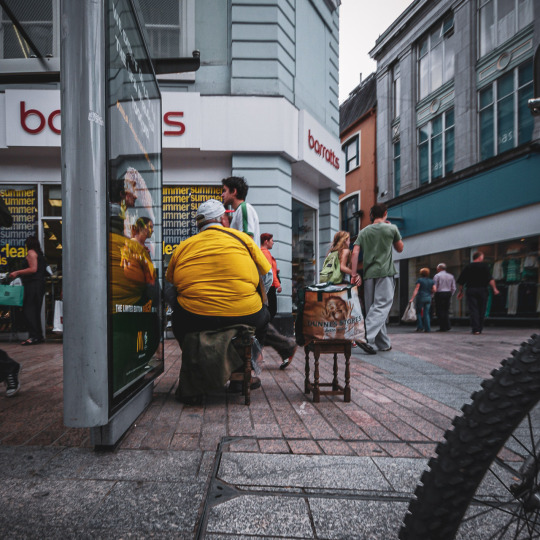
View On WordPress
0 notes
Photo

Accadde Oggi: 25 Ottobre 1920
Muore Terence MacSwiney, Sinn Féin Lord Mayor of Cork, dopo 74 giorni di sciopero della fame nella prigione di Brixton in Inghilterra.
Continua su Aforismi di un pazzo.
#Accadde Oggi#25 Ottobre#1920#Terence MaxSwiney#Sinn fein#lord mayor#Cork#Aforismi di un pazzo#Stefano Zorba
0 notes
Text
#OTD in 1920 - The inquest into the death of Tomás MacCurtain, Lord Mayor of Cork killed by policemen in disguise on 20 March, returns a verdict of willful murder against the RIC, and indicts Lloyd George and the British government.
A Cork jury returns a verdict of willful murder against British Prime Minister Lloyd George following the killing in March of Lord Mayor Tomas MacCurtain. The verdict read:
“We find that Alderman Tomas MacCurtain, Lord Mayor of Cork, died from shock and haemorrhage, caused by bullet wounds, and that he was wilfully wounded under circumstances of the most callous brutality; and that the murder was…

View On WordPress
#17 April 1920#British Government#History#History of Ireland#Inquest#Ireland#Irish History#Lloyd George#Lord Mayor of Cork#Today in Irish History#Tomás MacCurtain
9 notes
·
View notes
Text
Stay….he says. It’s what he always says, as though Jaskier was a small child or a particularly wayward puppy. He was neither of these things, obviously, but as he opens his mouth to protest for the umpteenth time, knowing full-well the argument is absolutely fruitless and completely self-indulgent he finds himself dispelled abruptly with the witcher’s second favorite silencing mechanism; piercing golden death glare. But, Jaskier was a man of principle, and arguing with Geralt was just that…a matter of principle.
Stay, Geralt whisper hisses over his shoulder, handing him Roach’s reins before sneaking ahead into an abandoned cave or shack or fog shrouded thicket or other such likely place, securing the area like some sort of overgrown, witchery body-guard. And while Geralt playing the big, bad protector did indeed have a rather charming ‘knight-in-shining-armor’ ring to it, Jaskier wasn’t completely useless.
Stay, he growls as he bandages Jaskier’s wounds, obtained more oft than not by merely tripping over his own feet, but that was hardly the point.
Stay, he says through gritted teeth, grabbing a fistful of Jaskier’s doublet and hauling him quickly behind the edge of a building before stepping out to put himself between Jaskier and this week’s angry lord, which sends a blush blooming in his cheeks for entirely different reasons. But, he had succeeded in out-foxing many a past dalliance long before Geralt came along and was well practiced at looking out for himself, thankyouverymuch.
Stay, Geralt orders before he takes off on a hunt, leaving Jaskier behind in camp or at an Inn, and no matter how he huffs and puffs and complains that if Geralt describes one more monster as ‘He was one-hundred feet tall with rolling orange eyes and rows and rows of bard-crushing teeth’, the witcher merely quirks a smile at him, golden eyes effectively rooting him to the spot once more as he swings up into the saddle and takes off into the growing twilight…and Jaskier absolutely does not swoon at that.
“Stay.” Geralt repeats even now, like a bloody mantra, and Jaskier barely looks up from where he’s scratching various rhymes and lyrics into his notebook with his tongue caught between his teeth.
*
Jaskier knows Geralt’s been gone too long as he strides up to the front of the tavern he’s playing in for his second set of the evening and the dim, corner table near the back remains steadfastly empty.
He knows Geralt’s been gone far too long as he gathers his coin and tucks away his lute, turning toward the stair leading up to their room with a worrying twist in his gut.
He knows something must be absolutely wrong as the hour turns later and later, pushing well into the realm of the wee morning with still no Geralt. So, he makes like any good friend, and builds himself up with reassurances that Geralt’s condition that he ‘stay’ surely came with provisos like ‘In the event of a Griffin evisceration, send help…particularly a devastatingly handsome bard with eyes the color of the bluest sky, and lips as sweet as cherry pie…strong enough to bench an ox and hands I wish would wrap my c—’ Okay, okay perhaps the last part was a bit wishful, but a bard could dream. More importantly, Geralt could be in trouble, and that certainly wouldn’t do…for a variety of reasons.
With one dagger tucked safely in his boot and another hidden away inside his doublet, he grabs his cloak and sets off into the night. The mayor who had contracted Geralt in the first place was understandably disgruntled, brushing his valet aside as Jaskier’s incessant hammering of the door, practically fit to break it in, finally yields results. Jaskier draws himself up importantly, waving aside the poor man’s outrage at the late night interrruption and proceeds to interrogate him about the location of the latest big bad Wyvern Geralt has been commissioned to dispatch. After talking the poor mayor hoarse, and apologizing again for the late hour, he bows his way off the front stoop and heads off in the direction of the mayor’s half-lucid gesturing, hoping against hope that he’s made the right choice.
There’s surely no better recipe for worry than walking alone down a dark forest path in the middle of the night by one’s self, fretting in equal measure about A. whether he’s made the right decision about venturing out in the first place; he had seen Geralt in action before, and knew the witcher was more than capable of taking care of himself. He flushed richly just thinking about how Geralt’s muscles rippled and flexed in the midst of a battle, effectively obliterating any wonder of why there was even a fight in the first place upon more than one occasion, and B. Hoping against hope that Geralt wasn’t actually seriously hurt, and that the hunt was just taking longer than normal because Wyverns were, by all accounts, very flighty and unpredictable beasts…with rolling orange eyes and rows and rows of bard-crushing teeth…bloody hell.
It takes Jaskier a surprisingly shorter amount of time to find Geralt than he thought it would, which was both a blessing and a curse as the witcher lay propped against a boulder breathing raggedly with a hand pressed over what appeared, even at a distance, to be a rather sizeable gash across his lower abdomen.
“Geralt!” Jaskier gasps aloud, closing the remaining distance between them at a desperate stumble.
“Jaskier…” Geralt breathes, drawing a slow, pained breath, “I told you to…”
“…I know, I know…stay” Jaskier shoots back, skidding onto his knees at Geralt’s side and examining the wound. It’s deep, judging by the blood that’s seeping slowly over Geralt’s fingers, and Jaskier swallows thickly, forcing himself to keep a cool head as he turns instead to rummage in his pack. He withdraws a bottle of alcohol (definitely not the drinking kind) and yanks the cork out with his teeth.
“Right now, I need you to stay…stay still unless you want me to suture your elbow to your crotch.” He manages to muster a small, encouraging smile as Geralt’s eyes flicker to his, before emptying the bottle over the wound, eliciting a sharp hiss from the witcher that makes Jaskier’s chest clench. He squeezes his eyes shut in a tight grimace as Geralt swears aloud, but he pushes it desperately aside, holding a small needle and thread up to his eyes. Jasier can see Geralt’s jaw clench and unclench in his periphery as he sets the point of the needle to the witkcher’s flesh. He can feel that piercing golden gaze on his face as he closes the wound, nimble fingers making quick work of the suturing and trying not concentrate on the way Geralt’s chest shudders with each stitch.
*
Stay, Jaskier whispers, helping him up on to Roach before climbing up in front and clicking the mare to a brisk walk so as not to disturb Geralt’s wounds.
Stay, Jaskier says reassuringly, lowering Geralt onto the bed and squeezing his hand just briefly before crossing the room to retrieve bandages.
Stay, he says, trying on his best imitation of Geralt’s glare before disappearing downstairs to retrieve food and Geralt’s favorite drink just so he can see the rare but nonetheless genuine smile Geralt reserved for the things he holds dearest in life (Ale, Roach and…well perhaps Jaskier ranked in there somewhere even if Geralt wasn’t exactly forthcoming…)
“…and now you’re going to stay here and rest…and let me take care of you…” He croons reassuringly, sitting upon the edge of the bed and reaching up hesitantly to brush a stray strand of silver off of Geralt’s face as the witcher levels him an un-readable look.
No sooner were the words out of his mouth, than Jaskier’s suddenly leaping from the bed as though burned, a wide-eyed look of comprehension dawning on his face as he darts across the room to his bag, wherein he knew resided an old dictionary. Ignoring Geralt’s grunts of surprise that chase over his retreating shoulder, his fingers flip madly through the pages until he finds the one he’s looking for:
Stay; /sta/ To remain in a specified state or position. To delay harm or risk or hurt. To prevent the threat of danger, harm, or loss. Often to impose the protection or safe-guarding of something valuable.
With an effort, Jaskier un-sticks his tongue from the roof of his mouth and swallows the lump in his throat, a somewhat guilty sensation writhing in his chest….
…Geralt had been taking care of him all this time.
‘Safe-guarding something valuable’ loops on repeat in his head as he closes the old book and slides it back into his bag before rising slowly and turning back toward the bed. He finds Geralt’s inquisitive golden gaze, the hard lines of his brow drawn in a question, and Jaskier finds himself fumbling for the right words.
“Y’know, just…thought of a word for a song..” He murmurs, waving a hand dismissively when Geralt simply continues to stare at him with a look that is equal parts concern as though he had suddenly taken ill and something else that he could only describe as indifference…which Geralt could hardly be condemned for, as impulsively diving for his notebook was something Jaskier was indeed prone to doing, and often.
“You can uh…you should take the bed and I’ll kip on the floor here….” He produces awkwardly but Geralt’s penetrating gaze doesn’t falter.
Suddenly there’s a hand on his forearm as Geralt’s fingers close tentatively around it;
“Stay.” Geralt says in a low whisper.
#my writing#the witcher#geralt of rivia#jaskier#geraskier#the witcher fandom#geralt x jaskier#geraskier fanfiction#fluff#needed something soft#soft geraskier#soft boy hours#they love each other#geralt’s love language
1K notes
·
View notes
Photo

Eamon de Valera, a leader of the Irish independence movement, delivered an address to a crowd estimated at 40,000 at the Polo Grounds late in 1920. The speech was a memorial in honor of Terence MacSwiney, the Lord Mayor of Cork, who had died in a British prison after a 74-day hunger strike in October.
Photo: NY Times
#New York#NYC#vintage New York#1920s#Eamon de Valera#Ireland#Irish independence#Polo Grounds#Terence MacSwiney#memorial
82 notes
·
View notes
Note
Did Henry VII call Cork the rebel county, or is that a myth?
Hello, anon! I have searched all the letters I have here that were written in Henry VII's own hand and I couldn't find the term. However, it's still possible that Cork was declared a 'rebel county' in one of the parliament sessions held during Henry VII's reign if, for example any of its residents were ever subjected to attainder or other sanctions. For one, we know Perkin Warbeck made his first public appearance there and that he received some welcome and support from important men of the town (though significantly, Perkin received no substantial support when he reappeared at Cork in 1497). Adding to that, after Henry VII placed the Earl of Kildare as his Lord Deputy in Ireland, there was in 1500 a rebellion in that city which Kildare suppressed by hanging the city’s very mayor.
What I mean is that if Cork really was referred to as 'the rebel county' it was most likely in an act of parliament, and not necessarily a term dubbed by Henry VII himself, spoken or written by him. I can confirm that in the surviving letters written by Henry VII he did not, but at the moment I don't have access to all the parliament statues of his reign to confirm whether the term was mentioned or not. It's also possible it was a term used by some Tudor chronicler and again, not necessarily by Henry VII himself. Where did you hear that information? 🌹x
7 notes
·
View notes
Link
“The first Jews to land on the Emerald Isle landed in 1079, according to the Irish Jewish Community website, when five Normandy merchants visited Tairdelbach, the King of Munster. They weren’t encouraged to stay.
Over the years, Jewish communities expelled from various European kingdoms settled in Dublin and Cork, only to be expelled by royal decrees and periodic pogroms. By 1900, about 3,770 Jews lived in Ireland, more than half in Dublin. Most came from Lithuania.
The community never really grew much, even after Robert Briscoe won the first of two elections for Lord Mayor of Dublin in the 1950s; he also served in the 1960s. But outbreaks of anti-Semitic behavior led to Jewish emigration to England, North America, or Israel throughout the 20th century. The population never grew to much more than 5,500. Even today, it’s difficult to know how many Jews live in Ireland; The Times of Israel reported between 500 and 2000 in 2013.”
8 notes
·
View notes
Text
Events 8.11 (After 1900)
1918 – World War I: The Battle of Amiens ends.
1919 – Germany's Weimar Constitution is signed into law.
1920 – The 1920 Cork hunger strike begins which eventually results in the deaths of three Irish Republicans including the Lord Mayor of Cork Terence MacSwiney.
1920 – The Latvian–Soviet Peace Treaty, which relinquished Russia's authority and pretenses to Latvia, is signed, ending the Latvian War of Independence.
1929 – Babe Ruth becomes the first baseball player to hit 500 home runs in his career with a home run at League Park in Cleveland, Ohio.
1934 – The first civilian prisoners arrive at the Federal prison on Alcatraz Island.
1942 – Actress Hedy Lamarr and composer George Antheil receive a patent for a Frequency-hopping spread spectrum communication system that later became the basis for modern technologies in wireless telephones, two-way radio communications, and Wi-Fi.
1945 – Poles in Kraków engage in a pogrom against Jews in the city, killing one and wounding five.
1952 – Hussein bin Talal is proclaimed King of Jordan.
1959 – Sheremetyevo International Airport, the second-largest airport in Russia, opens.
1960 – Chad declares independence from France.
1961 – The former Portuguese territories in India of Dadra and Nagar Haveli are merged to create the Union Territory Dadra and Nagar Haveli.
1962 – Vostok 3 launches from the Baikonur Cosmodrome and cosmonaut Andrian Nikolayev becomes the first person to float in microgravity.
1965 – Race riots (the Watts Riots) begin in the Watts area of Los Angeles, California.
1969 – The Apollo 11 astronauts are released from a three-week quarantine following their liftoff from the Moon.
1972 – Vietnam War: The last United States ground combat unit leaves South Vietnam.
1975 – East Timor: Governor Mário Lemos Pires of Portuguese Timor abandons the capital Dili, following a coup by the Timorese Democratic Union (UDT) and the outbreak of civil war between UDT and Fretilin.
1979 – Two Aeroflot Tupolev Tu-134s collide over the Ukrainian city of Dniprodzerzhynsk and crash, killing all 178 aboard both airliners.
1982 – A bomb explodes on Pan Am Flight 830, en route from Tokyo, Japan to Honolulu, Hawaii, killing one passenger and injuring 15 others.
1984 – "We begin bombing in five minutes": United States President Ronald Reagan, while running for re-election, jokes while preparing to make his weekly Saturday address on National Public Radio.
1988 – A meeting between Sayyed Imam Al-Sharif, Osama bin Laden, Abdullah Yusuf Azzam, and leaders of Egyptian Islamic Jihad in Afghanistan culminates in the formation of Al-Qaeda.
1992 – The Mall of America in Bloomington, Minnesota opens. At the time the largest shopping mall in the United States.
2000 – An air rage incident occurs on board Southwest Airlines Flight 1763 when 19-year-old Jonathan Burton attempts to storm the cockpit, but he is subdued by other passengers and dies from his injuries.
2003 – NATO takes over command of the peacekeeping force in Afghanistan, marking its first major operation outside Europe in its 54-year-history.
2003 – Jemaah Islamiyah leader Riduan Isamuddin, better known as Hambali, is arrested in Bangkok, Thailand.
2006 – The oil tanker MT Solar 1 sinks off the coast of Guimaras and Negros Islands in the Philippines, causing the country's worst oil spill.
2012 – At least 306 people are killed and 3,000 others injured in a pair of earthquakes near Tabriz, Iran.
2017 – At least 41 people are killed and another 179 injured after two passenger trains collide in Alexandria, Egypt.
0 notes
Text
Cork Lifelong Learning Festival | Mayfield Library

The Cork Lifelong Learning Festival was back with a bang this year with over 300 amazing events with approximately one third of these being hosted by your local library service!
Today we take a brief look at a number of the events organised by Mayfield library for this years festival.
“Rebels, Writers & Merchants” was a heritage walk conducted from Mayfield Library by Brendan Goggin for the Lifelong Learning Festival on Saturday, April 1st. Brendan led 50 local history aficionados along a trail encompassing Ashburton, Gardiner’s Hill, Ardnalaoi and finishing up at the Montenotte Hotel. Along the way listeners were enthralled by the exploits of local Republicans a hundred years ago, the life and times of Daniel Corkery and the pioneering ideas of John Holland on submarine engineering.
In the modern Ardnalaoi housing estate they saw the incorporated high walls of what was once the estate of the Quaker merchant family, the Carrolls. The walk finished up at the Montenotte Hotel which very generously provided tea and pastries to assist in continuing historical discussion and aid the recovery of tired legs. It was here Thomas Francis Meagher, Waterford, would visit the residence of his young Murphy friends (the distilling family) and, replete with revolutionary ideas from Paris 1848, outline his design for the tricolour that eventually became our national flag.
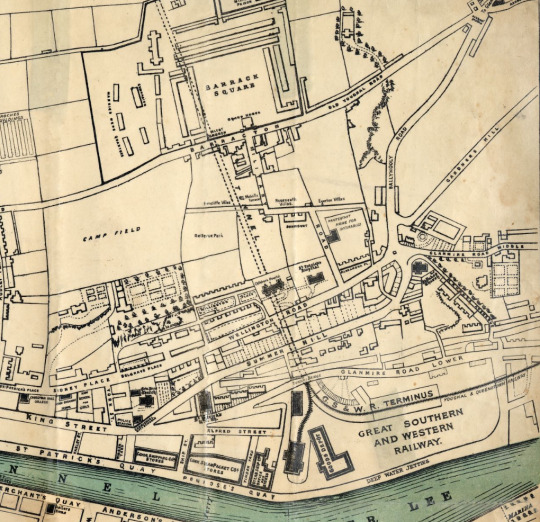
The Mayfield Lifelong Learning Expo returned this year and was held at the Mayfield Sports Complex on Wednesday, March 29th. The event was officially opened by Lord Mayor Deirdre Forde, who wished all the day’s participants continued success. EXPO 2023 showcased the activities run by the Mayfield Learning Neighbourhood and a whole host of social, community, educational and service providers in the area. All came together on the day to organise and promote learning and lifelong participation in learning. Mayfield Library’s stand was tended in rotation by branch staff and experienced a high level of engagement with local schools, local organisations and the general public.
Staff were kept busy throughout the day explaining library services and how they can be accessed. Combining on-the-spot tutoring and support literature, the public learned about downloadable book borrowing (BorrowBox), digital magazine access (Libby), languages and hobbies (Universal Class) as well as the more traditional library materials and activities available within the branch. Particularly fascinating to some was learning that Ireland’s public libraries are now linked up and taking membership with one allows use of all.
1 note
·
View note